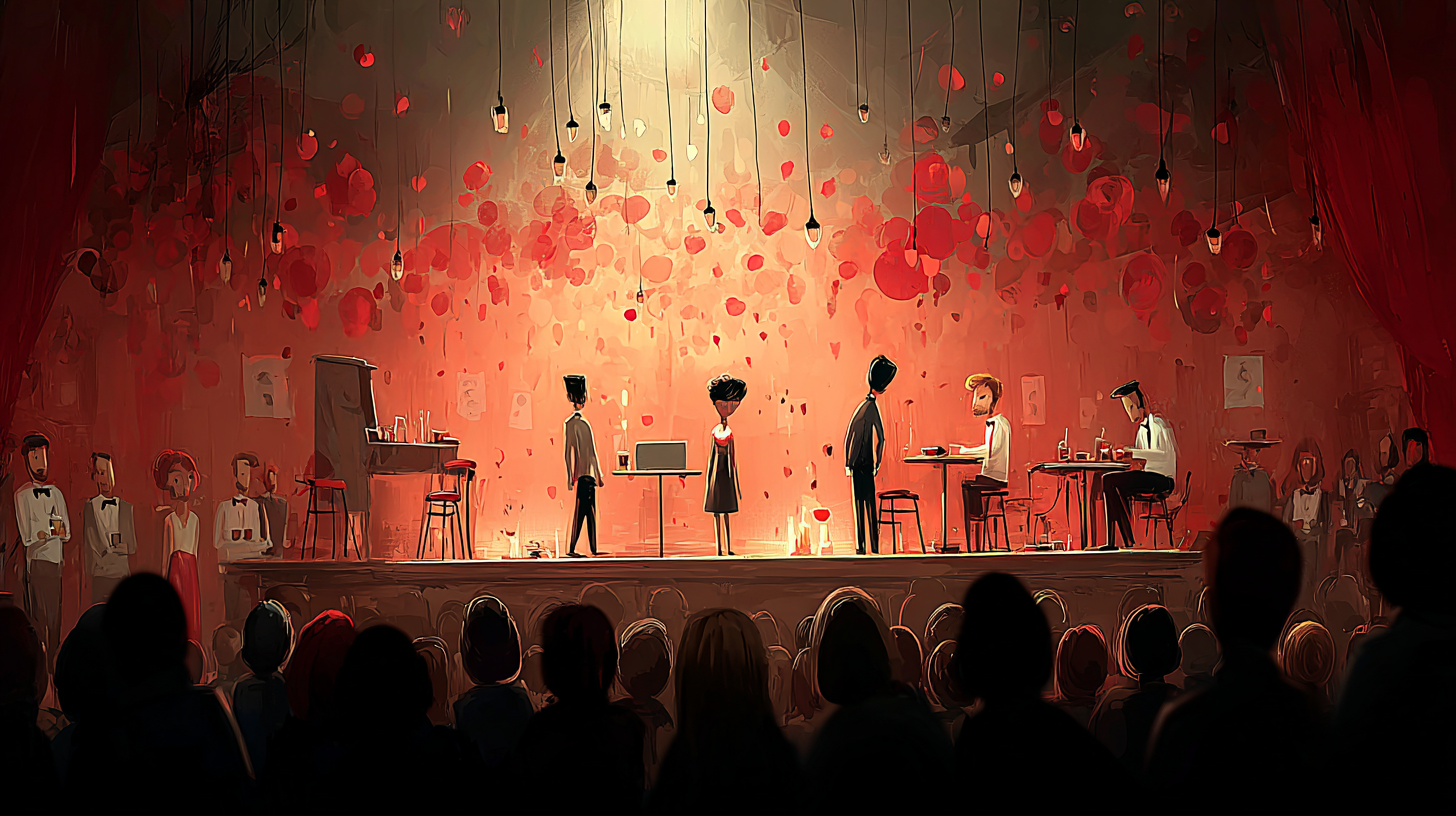The word “scene” means a part of a movie or play, a place of an event, or a field of activity.
「scene」は、映画や劇の場面、事故などの現場、または活動する世界を表す言葉です。
以下は英単語 “scene” に関するストーリー型学習コンテンツです。まずは大枠の意味を理解して最後の文章で確認しましょう。
主な意味(main meaning)
| 品詞 | 発音記号 (IPA) | 意味 | 英語例文 |
|---|---|---|---|
| 名詞 | /siːn/ | ①場面、シーン(映画や芝居の一部) | The movie has a beautiful beach scene. |
| ②現場、光景 | The police arrived at the scene of the accident. | ||
| ③活動の場、世界 | He is active in the music scene. |
語源(etymology)
「scene」はギリシャ語「skēnē(舞台)」から来ていて、もともとは「舞台上の場所」を意味しました。そこから「場面」や「光景」という意味に広がりました。
類義語(synonyms)
| 類義語 | 英語例文 |
|---|---|
| setting | The story takes place in a rural setting. |
| stage | She performed on the big stage. |
| location | They filmed the movie on location in Italy. |
| situation | The teacher handled the difficult situation well. |
反義語(antonyms)
| 反義語 | 英語例文 |
|---|---|
| reality | The dream seemed real, but it was far from reality. |
| imagination | Children often live in a world of imagination. |
コロケーション(collocations)
| コロケーション | 英語例文 |
|---|---|
| crime scene | The police investigated the crime scene carefully. |
| movie scene | The kissing scene made the audience laugh. |
| dramatic scene | The play ended with a dramatic scene. |
| behind the scenes | She worked hard behind the scenes to make the event a success. |
2項表現(binomials)
| 2項表現 | 英語例文 |
|---|---|
| peace and quiet | He moved to the countryside for some peace and quiet. |
| life and death | It was a matter of life and death at the hospital. |
英語ストーリー(english story)
A Scene at the Theater
Last Saturday, Yuki and her friend Ken went to the local theater to watch a new play. The setting was a small town in the countryside, and the first scene opened with a quiet street. Yuki whispered, “This scene looks just like my grandparents’ village.”
As the play continued, the actors performed on stage with great energy. In one dramatic scene, a family argued about money. Ken said, “This situation feels very real. It’s like I am watching my own family.” Yuki nodded, remembering that “scene” can also mean a situation or a part of real life.
During the break, they talked about the music scene in their town. Ken was active in a local band, and Yuki often helped behind the scenes at concerts. She enjoyed preparing tickets and making sure the stage was ready. “Even if people don’t see us, our work is important,” she said.
After the break, the play moved to a new location: a crime scene in a dark alley. A detective appeared and began to investigate. The audience grew silent, watching carefully. The actors created tension as they showed the fear of the witnesses. Yuki thought, “The director really knows how to use a scene to tell a story.”
Later, a character stood on stage and spoke about life and death. It was the most powerful part of the play. Everyone in the theater felt the seriousness of the words. Yuki wrote in her notebook, “The scene about life and death was unforgettable.”
When the play ended, the audience clapped loudly. Ken said, “That was not just entertainment. It showed the reality of life.” Yuki agreed but added, “At the same time, it needed imagination to create such a strong story.”
On their way home, they walked through the quiet streets. “Do you want some peace and quiet after such a dramatic evening?” Ken asked. Yuki laughed and replied, “Yes, but I will never forget today’s scenes. They taught me that behind every story, there is both reality and imagination.”
和訳
劇場でのシーン
先週の土曜日、ユキと友達のケンは、地元の劇場に新しいお芝居を見に行きました。舞台のsetting(背景)は田舎の小さな町で、最初のscene(場面)は静かな通りから始まりました。ユキは小声で「このscene(場面)、おじいちゃんおばあちゃんの村みたい」と言いました。
お芝居が進むと、俳優たちは元気いっぱいに**stage(舞台)で演じました。あるdramatic scene(劇的な場面)では、家族が金銭について口論しました。ケンは「このsituation(状況)**はすごくリアルだ。自分の家を見ているみたいだ」と言いました。ユキはうなずき、「scene」には現実の一部や状況という意味もあることを思い出しました。
休憩中、二人は町の**music scene(音楽の世界)について話しました。ケンは地元のバンドで活動していて、ユキはよくコンサートのbehind the scenes(舞台裏)**で手伝っていました。チケットを準備したり、**stage(舞台)**を整えたりするのが好きだったのです。ユキは「お客さんには見えないけど、私たちの仕事は大事だね」と言いました。
休憩後、舞台は暗い路地の**crime scene(犯罪現場)に移りました。探偵が登場して調査を始めました。観客は静まり返り、じっと見守りました。俳優たちは目撃者の恐怖を表現し、緊張感が高まりました。ユキは「監督は本当にscene(場面)**の使い方を知っている」と思いました。
やがて、ある登場人物が**stage(舞台)**に立ち、「life and death(生と死)」について語りました。それは劇の中で最も強い印象を残す部分でした。観客全員が言葉の重みを感じました。ユキはノートに「**life and death(生と死)のscene(場面)**は忘れられない」と書きました。
劇が終わると、観客は大きな拍手を送りました。ケンは「ただの娯楽じゃなかったね。人生の**reality(現実)を見せてくれた」と言いました。ユキは同意しましたが、「同時に、強い物語を作るためにはimagination(想像力)**も必要だよ」と付け加えました。
帰り道、二人は静かな通りを歩きました。「こんな劇的な夜の後は**peace and quiet(平和で静かな時間)が欲しい?」とケンが尋ねました。ユキは笑って答えました。「うん。でも今日のscenes(場面)は一生忘れない。どんな物語にもreality(現実)とimagination(想像)**の両方があることを学んだから。」
Q&A
Q: “scene” と “setting” はどう違いますか?
A: “scene”は物語や劇、映画の中の「具体的な場面」を指します。一方で “setting” は物語や出来事が起こる「背景」や「環境」を意味します。
例:映画の「村の広場での会話」は scene、映画全体が「田舎の村で起こる」のは setting。
Q: “scene” と “stage” はどう違いますか?
A: “stage” は物理的な「舞台」を意味します。それに対して “scene” はその舞台や映画の中で演じられる「場面」を表します。
例:舞台そのものに立つのは stage、そこで演じられる一つの出来事は scene。
Q: “scene” と “location” はどう違いますか?
A: “location” は出来事や撮影が行われる「場所」に焦点を当てます。一方で “scene” はその場所で起こる「場面・出来事」に焦点を当てます。
例:映画をイタリアで撮影するのは location、イタリアの街角での会話は scene。
Q: “scene” と “situation” はどう違いますか?
A: “situation” は「その人が直面している状態や条件」を表します。一方で “scene” は物語や現実の「切り取られた一場面」を表します。
例:お金が足りないというのは situation、それを舞台で演じているのは scene。
Q: “scene” と “reality” はどう違いますか?
A: “reality” は「現実そのもの」を指します。“scene” は現実や物語の中の「一部分、場面」を指します。
例:事故そのものが reality、事故現場を描写するのが scene。
Q: “scene” と “imagination” はどう違いますか?
A: “imagination” は「頭の中でつくる想像の世界」です。一方で “scene” は現実や想像を「具体的に切り取った場面」として表します。
例:想像することが imagination、それを絵や映画で表すと scene。
Q: “scene” と “crime scene” はどう違いますか?
A: “crime scene” は “scene” の特別な使い方で、「犯罪が起きた場面・現場」を意味します。
Q: “scene” と “behind the scenes” はどう違いますか?
A: “scene” は観客の前に見せられる場面を指しますが、“behind the scenes” は「表には出ない舞台裏の活動」を意味します。
Q: “scene” と “dramatic scene” はどう違いますか?
A: “dramatic scene” は “scene” の一種で、「特に強い感情や緊張を含む場面」を指します。つまり dramatic scene は scene の中の特別なタイプ。
Q: “scene” と “peace and quiet” はどう違いますか?
A: “peace and quiet” は慣用表現で「静かで落ち着いた時間」を意味します。“scene” は具体的な場面のことなので、概念的に異なります。
Q: “scene” と “life and death” はどう違いますか?
A: “life and death” は対になる表現で「生と死」という大きなテーマを示します。“scene” はそのテーマを描く具体的な場面を指します。



コメント